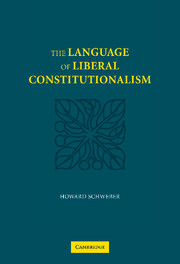Book contents
- Frontmatter
- Contents
- Introduction
- 1 The Search for Sovereignty: Law, Language, and the Beginnings of Modern Constitutionalism
- 2 Consent How? Challenges to Lockean Constitutionalism
- 3 Constitutional Language and the Possibility of Binding Commitments
- 4 Consent to What? Exclusivity and Completeness in Constitutional and Legal Language
- 5 The Question of Substance: Morality, Law, and Constitutional Legitimacy
- 6 The Defense of Constitutional Language
- Bibliography
- Index
1 - The Search for Sovereignty: Law, Language, and the Beginnings of Modern Constitutionalism
Published online by Cambridge University Press: 17 July 2009
- Frontmatter
- Contents
- Introduction
- 1 The Search for Sovereignty: Law, Language, and the Beginnings of Modern Constitutionalism
- 2 Consent How? Challenges to Lockean Constitutionalism
- 3 Constitutional Language and the Possibility of Binding Commitments
- 4 Consent to What? Exclusivity and Completeness in Constitutional and Legal Language
- 5 The Question of Substance: Morality, Law, and Constitutional Legitimacy
- 6 The Defense of Constitutional Language
- Bibliography
- Index
Summary
Liberal constitutionalism is a recent invention, but its historical roots lie deep in Renaissance and Early Modern thought. An examination of the problems and the arguments that gave rise to the concept of liberal constitutionalism goes a long way toward clarifying the special role that authority over language plays in establishing the legitimacy of a constitutional regime.
At the beginning of the modern era, the question of political legitimation became the search for the true source of sovereignty. The search for sovereignty arose from the desire for a basis for human political authority unmoored from assertions of theological orthodoxy. In the fifth century c.e., Augustine had proposed that the survival of a state depended on its being governed in accordance with Christian teachings, rather than on the republican virtues that had been emphasized by writers such as Aristotle and Polybius. As a consequence, Augustine concluded that a government owed a duty to its people to provide Christian governance by virtue of its duty to promote the state's existence. In the fifteenth century, Florentine republican writers, among whom Machiavelli was the leading figure, argued that Augustine had it wrong. Confronted by the record of a millennium of religious conflict, and inspired by the recent rediscovery of ancient texts of classical republicanism, Machiavelli proposed that the key to creating and preserving the state was either a restoration of republican virtue or else the tyrannical but effective rule of a Prince bereft of either republican or Christian virtue.
- Type
- Chapter
- Information
- The Language of Liberal Constitutionalism , pp. 16 - 80Publisher: Cambridge University PressPrint publication year: 2007

